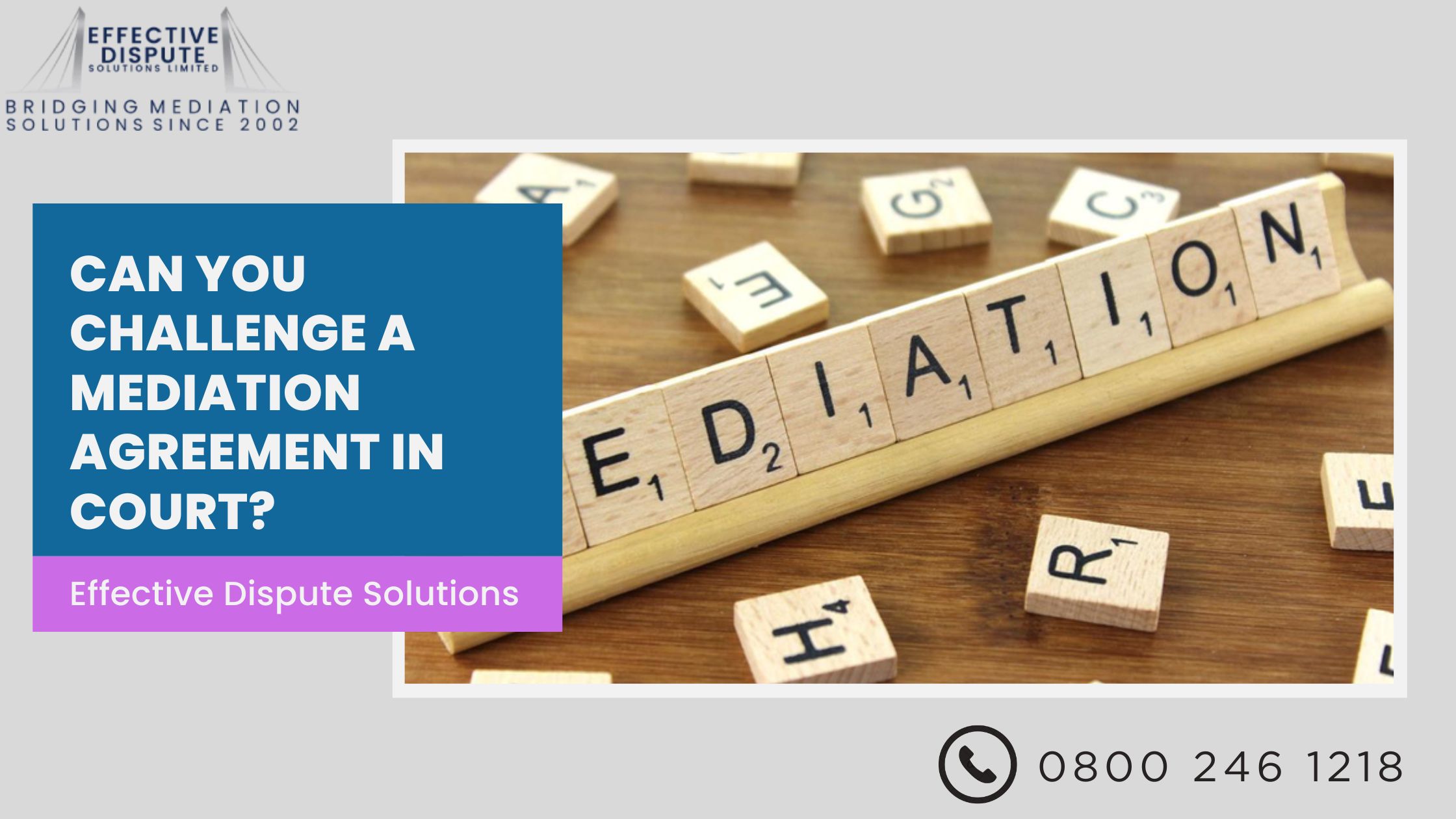The mediation agreement you’ve signed. It could be a commercial matter, or a family disagreement or even a more minor dispute.
Now, you’re wondering what happens if you want to contest a mediation deal in court?
The agreements reached through mediation can be used to achieve closure. But, things change, and there are times when one side believes that the agreement no longer works for the other. What happens next? It depends on the mediation type and the agreement that was signed, and also on how it relates to the law.
What Is a Mediation Agreement?
The mediation agreement is the document signed by both parties, once they have come to a solution. At mediations, both disputants discuss their issues by working with an impartial mediator. When both sides reach a common point of view, the settlement is recorded and then it is signed.
It’s not just a “handshake deal.” In the majority of cases, a signed mediation contract is legally obligatory. The sole exceptions to this are:
- Community mediation (like neighbours who have disputes of a low level) is often based on trust and good-faith.
- Mediation in the workplace is typically based on contracts made in good faith, not legally binding legal agreements.
For commercial, civil and many familial disputes, the mediation agreement is legally enforceable. This means that if a party breaches it, the party that is aggrieved can sue the breaching party through court, asking for the agreement to be enforced.
Is It Legally Binding?
When you sign, the result of mediation is a binding agreement.
Consider the process this way: mediation itself is voluntary. Nobody is compelled to accept. Once you’ve decided to sign the contract, you’ve created an alternate dispute settlement arrangement that has the same legal effect similar to any other agreement.
Can mediation also be utilised as a courtroom argument? It is possible, but not in confidential discussions; however, the actual agreement could be enforced and presented before a tribunal or court in the event that one party does not agree to follow the agreement.
What Happens If You Break a Mediation Agreement?
This is where the law comes in. In the event that you violate a mediation agreement:
- The other side can go to court, using the agreement to enforce its terms.
- The result could be an additional court order that requires compliance.
- In cases of commercial or civil litigation, the violation of mediation rules could cause additional fees to be assessed against you.
If, for instance, you agreed to settle a dispute through six instalments but then did not follow through, and only made one installment. The opposing party is entitled to request the court to enforce the agreement. Asking for the full amount possibly immediately.
Can You Challenge a Mediation Agreement in Court?
In short, yes, however, only under particular circumstances. Courts don’t allow individuals who are in a position to “change their mind” simply due to regretting what they had agreed upon. But you can contest or rescind the mediation agreement when you have legal grounds. They include:
- False or fraudulent representation: When someone deliberately misrepresented or concealed crucial information.
- The pressure: If you’ve been in a position of being pressured or threatened to sign.
- Error: If both parties had signed on the basis of a simple mistake, and a significant one.
- In family law, there is a tendency to be unfair. For certain family-related mediation agreements, courts can review the agreement to determine whether the agreement is fair, particularly if children are included.
Example:
Imagine a dispute between two small businesses in which one party agrees to settle for the sum of £30,000. It later becomes clear that the opposing party had kept financial records that prove that the amount was exaggerated. A judge could look into this to contest the settlement.
How to Prepare for Small Claims Mediation UK?
Many readers are asking the question: What should I do to plan for small claims mediation in the UK?
Here are a few practical suggestions:
- Decide in advance the amount you’re willing to settle for.
- Take all pertinent receipts, invoices, or statements.
- Prioritise what’s most important. Determine in advance what goals you want to achieve, and also how much you are willing to compromise.
- Keep your language neutral. Mediation isn’t as formal as courts. It’s an opportunity to discover an agreement.
- Consider the long term. The settlement may be smaller, but a quicker resolution could be more beneficial than months of anxiety.
- Make sure you are clear and comfortable on what you are signing. It is a legally binding agreement, only sign it, if you can and will stick to it.
Why Courts Respect Mediation?
Mediation can be a component of what judges call an alternative dispute resolution (ADR). Courts are now requiring parties to attempt mediation prior to proceeding with a full trial. In some situations, courts can penalise those who do not attend mediation without valid justification.
Why? It’s because it’s quicker, less expensive and less stress-inducing. Mediation can avoid lengthy court hearings, legal costs, as well as ongoing conflict. So, after an agreement for mediation is made, the courts are not likely to encourage the parties to challenge it later. The courts want parties to stick to their decisions.
Should You Challenge or Comply?
Begin by asking yourself these questions:
- Did I get it wrong?
- Did I feel pressured to sign?
- Do both sides truly understand the terms we came to?
- If I agree, then what benefit will I gain from this compared to fighting it more?
In many cases, executing with the agreement is the best option. In most cases, challenging a mediation agreement will result in court proceedings being reintroduced and can lead to delays, costs and the risk of uncertainty.If you can prove the existence of fraud, duress or unfairness, a solicitor will be able to tell you if it is possible to challenge the law.
FAQs
Are mediation agreements enforceable?
If you breach one or more of the terms, the opposing party may apply to the court, for breach and enforcement of the same.
What happens if I’m unhappy with my decision?
The mere fact of regret is insufficient. Caveat emptor (you are liable for what you sign). There are legal reasons to be considered, for example, dishonesty or coercion or a mistake. However, this in reality is very rare.
Can mediation agreements be utilised in court?
Yes. Although the mediation discussions are private, the signed agreement is able to be cited in courts for enforcement.
Conclusion: Know What You’re Signing
Mediation agreements are not an option to be taken lightly. When it is signed, it typically has the same force as an order from a judge. The possibility of reversing it can only be done in remarkably rare instances of severe or rare cases.
It’s the reason you need to be prepared. Prior to signing, you must be certain of your rights, priorities and the things you’re able to promise. Ask questions during mediation. Make sure you take your time before laying down your signature.
The agreement you sign could end an uneasy chapter and spare the time of fighting in court. However, it must be one you’re able and confident about honouring. If you’re ever uncertain, know that help can be sought from trusted companies such as Effective Dispute Solutions, which have helped thousands in difficult mediation situations.


